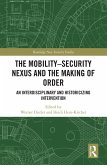The Mobility-Security Nexus and the Making of Order (eBook, ePUB)
An Interdisciplinary and Historicizing Intervention
Redaktion: Hein-Kircher, Heidi; Distler, Werner
42,95 €
42,95 €
inkl. MwSt.
Sofort per Download lieferbar

21 °P sammeln
42,95 €
Als Download kaufen

42,95 €
inkl. MwSt.
Sofort per Download lieferbar

21 °P sammeln
Jetzt verschenken
Alle Infos zum eBook verschenken
42,95 €
inkl. MwSt.
Sofort per Download lieferbar
Alle Infos zum eBook verschenken

21 °P sammeln
The Mobility-Security Nexus and the Making of Order (eBook, ePUB)
An Interdisciplinary and Historicizing Intervention
Redaktion: Hein-Kircher, Heidi; Distler, Werner
- Format: ePub
- Merkliste
- Auf die Merkliste
- Bewerten Bewerten
- Teilen
- Produkt teilen
- Produkterinnerung
- Produkterinnerung

Bitte loggen Sie sich zunächst in Ihr Kundenkonto ein oder registrieren Sie sich bei
bücher.de, um das eBook-Abo tolino select nutzen zu können.
Hier können Sie sich einloggen
Hier können Sie sich einloggen
Sie sind bereits eingeloggt. Klicken Sie auf 2. tolino select Abo, um fortzufahren.

Bitte loggen Sie sich zunächst in Ihr Kundenkonto ein oder registrieren Sie sich bei bücher.de, um das eBook-Abo tolino select nutzen zu können.
The book explores the complex, multi-directional connections of the "mobility/security nexus" in the re-ordering of states, empires, and markets in historical perspective.
- Geräte: eReader
- ohne Kopierschutz
- eBook Hilfe
- Größe: 2.72MB
Andere Kunden interessierten sich auch für
![The Mobility-Security Nexus and the Making of Order (eBook, PDF) The Mobility-Security Nexus and the Making of Order (eBook, PDF)]() The Mobility-Security Nexus and the Making of Order (eBook, PDF)42,95 €
The Mobility-Security Nexus and the Making of Order (eBook, PDF)42,95 €![Civil Society, Peacebuilding, and Economic Assistance in Northern Ireland (eBook, ePUB) Civil Society, Peacebuilding, and Economic Assistance in Northern Ireland (eBook, ePUB)]() Sean ByrneCivil Society, Peacebuilding, and Economic Assistance in Northern Ireland (eBook, ePUB)42,95 €
Sean ByrneCivil Society, Peacebuilding, and Economic Assistance in Northern Ireland (eBook, ePUB)42,95 €![The Routledge Handbook of the Cold War (eBook, ePUB) The Routledge Handbook of the Cold War (eBook, ePUB)]() The Routledge Handbook of the Cold War (eBook, ePUB)57,95 €
The Routledge Handbook of the Cold War (eBook, ePUB)57,95 €![Trade, Empire and British Foreign Policy, 1689-1815 (eBook, ePUB) Trade, Empire and British Foreign Policy, 1689-1815 (eBook, ePUB)]() Jeremy BlackTrade, Empire and British Foreign Policy, 1689-1815 (eBook, ePUB)52,95 €
Jeremy BlackTrade, Empire and British Foreign Policy, 1689-1815 (eBook, ePUB)52,95 €![NATO and Western Perceptions of the Soviet Bloc (eBook, ePUB) NATO and Western Perceptions of the Soviet Bloc (eBook, ePUB)]() Evanthis HatzivassiliouNATO and Western Perceptions of the Soviet Bloc (eBook, ePUB)42,95 €
Evanthis HatzivassiliouNATO and Western Perceptions of the Soviet Bloc (eBook, ePUB)42,95 €![The Greek Junta and the International System (eBook, ePUB) The Greek Junta and the International System (eBook, ePUB)]() The Greek Junta and the International System (eBook, ePUB)42,95 €
The Greek Junta and the International System (eBook, ePUB)42,95 €![European Recovery and the Search for Western Security, 1946-1948 (eBook, ePUB) European Recovery and the Search for Western Security, 1946-1948 (eBook, ePUB)]() European Recovery and the Search for Western Security, 1946-1948 (eBook, ePUB)42,95 €
European Recovery and the Search for Western Security, 1946-1948 (eBook, ePUB)42,95 €-
-
-
The book explores the complex, multi-directional connections of the "mobility/security nexus" in the re-ordering of states, empires, and markets in historical perspective.
Dieser Download kann aus rechtlichen Gründen nur mit Rechnungsadresse in A, B, BG, CY, CZ, D, DK, EW, E, FIN, F, GR, HR, H, IRL, I, LT, L, LR, M, NL, PL, P, R, S, SLO, SK ausgeliefert werden.
Produktdetails
- Produktdetails
- Verlag: Taylor & Francis
- Seitenzahl: 322
- Erscheinungstermin: 21. Juli 2022
- Englisch
- ISBN-13: 9781000620054
- Artikelnr.: 64150544
- Verlag: Taylor & Francis
- Seitenzahl: 322
- Erscheinungstermin: 21. Juli 2022
- Englisch
- ISBN-13: 9781000620054
- Artikelnr.: 64150544
- Herstellerkennzeichnung Die Herstellerinformationen sind derzeit nicht verfügbar.
Werner Distler is a political scientist, with a focus on peace and conflict studies. He works as researcher at the Center for Conflict Studies and the Collaborative Research Center "Dynamics of Security" at Marburg University, Germany. Heidi Hein-Kircher is a historian and the head of the Department Academic Forum at Herder-Institute on Historical Research on East Central Europe.
Part I: Introduction 1. Historizing the Mobility/Security Nexus:
Introductory Remarks Part II: Conceptual and Theoretical Reflections 2. The
Security/Mobility Nexus as an Analytical Lens: The Cases of
Counterterrorism and Infrastructure 3. Ordering Movement and Mobilizing
Security: On the Production of 'Critical Infrastructure' 4. Thresholds of
Threat in (Historical) Security Cultures: Overcoming the Good-Versus-Bad
Mobilities Dichotomy Part III: Case Studies Section 1: (Re)Ordering States
and Societies 5. Securitization as a Driving Force for Political
Mobilization of National Movements 6. State Order, Mobility, and Policing
in the Trust Territory of New Guinea. Patrolling the 'Periphery' 7. Spatial
(Im)Mobility as a Threat to Social Mobility: Roma in the Peripheries of
Rome and the NIMBY Politics of campi nomadi Section 2: (Re)Ordering Empires
8. Struggles with Mass-Migrations, National- and State-Interests in the
Late Habsburg Empire: Security through Mobility or against Mobility? 9.
Nineteenth-Century Labor Migration and Fear of Epidemics in the British
Colony of Mauritius (c. 1834-1910): A Danger to Public Health? 10. Securing
the Flows of Oil in a Transottoman Context: Baku's Oil, Infrastructures of
Transportation, and Mendeleev as an Imperial Expert of Securitization
(1850-1918) Section 3: (Re)Ordering Markets 11. Securitization Practices of
Traveling Merchants and Mercenaries (14th-17th century) 12. Anti-Nuclear
Activism, the State, and the Energy Market in the Federal Republic of
Germany: Mobilizing Power 13. 'Critical' Financial Infrastructures and the
Securitization of Calculative Micro-processes Part IV: Concluding Remarks
14. Security, Mobility, and the Colonial Connection: Concluding Remarks
Introductory Remarks Part II: Conceptual and Theoretical Reflections 2. The
Security/Mobility Nexus as an Analytical Lens: The Cases of
Counterterrorism and Infrastructure 3. Ordering Movement and Mobilizing
Security: On the Production of 'Critical Infrastructure' 4. Thresholds of
Threat in (Historical) Security Cultures: Overcoming the Good-Versus-Bad
Mobilities Dichotomy Part III: Case Studies Section 1: (Re)Ordering States
and Societies 5. Securitization as a Driving Force for Political
Mobilization of National Movements 6. State Order, Mobility, and Policing
in the Trust Territory of New Guinea. Patrolling the 'Periphery' 7. Spatial
(Im)Mobility as a Threat to Social Mobility: Roma in the Peripheries of
Rome and the NIMBY Politics of campi nomadi Section 2: (Re)Ordering Empires
8. Struggles with Mass-Migrations, National- and State-Interests in the
Late Habsburg Empire: Security through Mobility or against Mobility? 9.
Nineteenth-Century Labor Migration and Fear of Epidemics in the British
Colony of Mauritius (c. 1834-1910): A Danger to Public Health? 10. Securing
the Flows of Oil in a Transottoman Context: Baku's Oil, Infrastructures of
Transportation, and Mendeleev as an Imperial Expert of Securitization
(1850-1918) Section 3: (Re)Ordering Markets 11. Securitization Practices of
Traveling Merchants and Mercenaries (14th-17th century) 12. Anti-Nuclear
Activism, the State, and the Energy Market in the Federal Republic of
Germany: Mobilizing Power 13. 'Critical' Financial Infrastructures and the
Securitization of Calculative Micro-processes Part IV: Concluding Remarks
14. Security, Mobility, and the Colonial Connection: Concluding Remarks
Part I: Introduction 1. Historizing the Mobility/Security Nexus:
Introductory Remarks Part II: Conceptual and Theoretical Reflections 2. The
Security/Mobility Nexus as an Analytical Lens: The Cases of
Counterterrorism and Infrastructure 3. Ordering Movement and Mobilizing
Security: On the Production of 'Critical Infrastructure' 4. Thresholds of
Threat in (Historical) Security Cultures: Overcoming the Good-Versus-Bad
Mobilities Dichotomy Part III: Case Studies Section 1: (Re)Ordering States
and Societies 5. Securitization as a Driving Force for Political
Mobilization of National Movements 6. State Order, Mobility, and Policing
in the Trust Territory of New Guinea. Patrolling the 'Periphery' 7. Spatial
(Im)Mobility as a Threat to Social Mobility: Roma in the Peripheries of
Rome and the NIMBY Politics of campi nomadi Section 2: (Re)Ordering Empires
8. Struggles with Mass-Migrations, National- and State-Interests in the
Late Habsburg Empire: Security through Mobility or against Mobility? 9.
Nineteenth-Century Labor Migration and Fear of Epidemics in the British
Colony of Mauritius (c. 1834-1910): A Danger to Public Health? 10. Securing
the Flows of Oil in a Transottoman Context: Baku's Oil, Infrastructures of
Transportation, and Mendeleev as an Imperial Expert of Securitization
(1850-1918) Section 3: (Re)Ordering Markets 11. Securitization Practices of
Traveling Merchants and Mercenaries (14th-17th century) 12. Anti-Nuclear
Activism, the State, and the Energy Market in the Federal Republic of
Germany: Mobilizing Power 13. 'Critical' Financial Infrastructures and the
Securitization of Calculative Micro-processes Part IV: Concluding Remarks
14. Security, Mobility, and the Colonial Connection: Concluding Remarks
Introductory Remarks Part II: Conceptual and Theoretical Reflections 2. The
Security/Mobility Nexus as an Analytical Lens: The Cases of
Counterterrorism and Infrastructure 3. Ordering Movement and Mobilizing
Security: On the Production of 'Critical Infrastructure' 4. Thresholds of
Threat in (Historical) Security Cultures: Overcoming the Good-Versus-Bad
Mobilities Dichotomy Part III: Case Studies Section 1: (Re)Ordering States
and Societies 5. Securitization as a Driving Force for Political
Mobilization of National Movements 6. State Order, Mobility, and Policing
in the Trust Territory of New Guinea. Patrolling the 'Periphery' 7. Spatial
(Im)Mobility as a Threat to Social Mobility: Roma in the Peripheries of
Rome and the NIMBY Politics of campi nomadi Section 2: (Re)Ordering Empires
8. Struggles with Mass-Migrations, National- and State-Interests in the
Late Habsburg Empire: Security through Mobility or against Mobility? 9.
Nineteenth-Century Labor Migration and Fear of Epidemics in the British
Colony of Mauritius (c. 1834-1910): A Danger to Public Health? 10. Securing
the Flows of Oil in a Transottoman Context: Baku's Oil, Infrastructures of
Transportation, and Mendeleev as an Imperial Expert of Securitization
(1850-1918) Section 3: (Re)Ordering Markets 11. Securitization Practices of
Traveling Merchants and Mercenaries (14th-17th century) 12. Anti-Nuclear
Activism, the State, and the Energy Market in the Federal Republic of
Germany: Mobilizing Power 13. 'Critical' Financial Infrastructures and the
Securitization of Calculative Micro-processes Part IV: Concluding Remarks
14. Security, Mobility, and the Colonial Connection: Concluding Remarks







